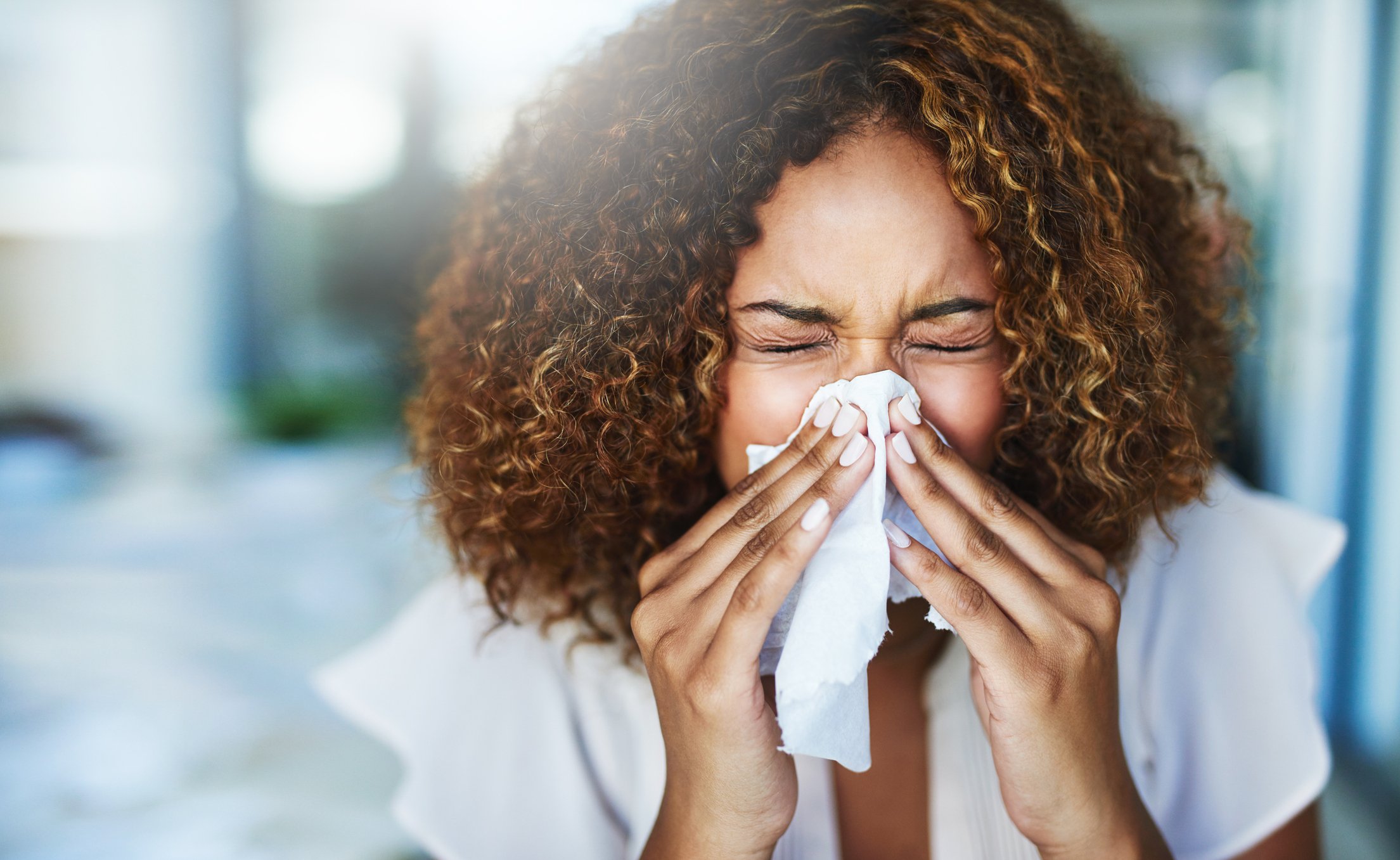
Allergic Rhinitis
Allergic rhinitis, also known as hay fever, impacts allergy sufferers in New York during seasonal allergies and high concentration of pollen in the air, which triggers the inflammation of the nasal passages with sneezing, congestion and runny nose.
What Is Allergic Rhinitis
Allergic rhinitis, commonly known as hay fever, is a chronic inflammatory condition of the nasal passages triggered by an allergic response to airborne allergens. It is characterized by symptoms such as sneezing, nasal congestion, itching, and rhinorrhea (runny nose). Allergic rhinitis can significantly impair the quality of life, affecting sleep, work productivity, and daily activities.
Causes of Hay Fever
Allergic rhinitis is primarily caused by an immune response to allergens, which are substances that provoke allergic reactions. Common allergens include pollen from trees, grasses, and weeds, dust mites, animal dander, mold spores, and certain foods. When individuals with allergic predispositions are exposed to these allergens, their immune system overreacts, releasing histamine and other inflammatory mediators, leading to the characteristic symptoms of allergic rhinitis.
Signs and Symptoms of Allergic Rhinitis
The signs and symptoms of allergic rhinitis can vary in severity and may include:
Sneezing
Nasal congestion
Runny or itchy nose
Postnasal drip
Itchy or watery eyes
Coughing
Fatigue
Headache
Decreased sense of smell or taste
Symptoms are often seasonal, occurring during specific times of the year when particular allergens are prevalent (e.g., pollen in spring or fall). However, allergic rhinitis can also be perennial, persisting throughout the year due to constant exposure to indoor allergens like dust mites and pet dander.
Risk Factors of Allergic Rhinitis
Several factors increase the risk of developing allergic rhinitis, including:
Family history of allergies or hay fever
Personal history of other allergic conditions, such as asthma or eczema
Environmental factors, such as exposure to tobacco smoke, air pollution, or occupational allergens
Living in urban areas with higher levels of airborne allergens
Certain occupational exposures, such as working in environments with high dust or chemical exposure
Known Complications in Allergic Rhinitis
In addition to the symptoms mentioned above, allergic rhinitis can also lead to complications such as:
Sinus infections (sinusitis)
Ear infections (otitis media)
Sleep disturbances (due to nasal congestion and snoring)
Impaired cognitive function and reduced productivity
Exacerbation of asthma symptoms in individuals with coexisting asthma
How is Allergic Rhinitis Diagnosed?
Diagnosing allergic rhinitis involves a comprehensive evaluation of medical history, physical examination, and sometimes allergy testing. Key steps in the diagnostic process include:
Detailed patient history to assess symptoms, triggers, and impact on daily life
Physical examination, focusing on the nasal passages, eyes, ears, and throat
Allergy testing, including skin prick tests or blood tests (specific IgE tests) to identify allergens triggering allergic reactions
Treatments for Allergic Rhinitis
Treatment of hay fever aims to alleviate symptoms, reduce inflammation, and improve quality of life. Treatment options include:
Allergen avoidance: Identifying and minimizing exposure to allergens, such as using air purifiers, encasing bedding in allergen-proof covers, and keeping pets out of bedrooms.
Antihistamines: Block histamine release and alleviate itching, sneezing, and runny nose.
Nasal corticosteroids: Reduce inflammation and alleviate nasal congestion, sneezing, and runny nose.
Decongestants: Relieve nasal congestion by constricting blood vessels in the nasal passages.
Intranasal anticholinergics: Reduce nasal discharge and improve symptoms of rhinorrhea.
Immunotherapy: Allergy shots or sublingual immunotherapy (under-the-tongue tablets) can help desensitize the immune system to specific allergens, reducing allergic reactions over time.
Nasal irrigation: Saline nasal rinses can help clear nasal passages and alleviate symptoms of congestion and rhinorrhea.
Preventive Measures for Hay Fever
Preventing allergic rhinitis involves minimizing exposure to allergens and implementing strategies to manage allergic triggers. Key preventive measures include:
Identifying and avoiding allergens whenever possible, such as staying indoors during high pollen seasons, keeping windows closed, and using air conditioning with proper filters.
Regular cleaning to reduce indoor allergens, including vacuuming carpets, washing bedding in hot water, and using allergen-proof covers on pillows and mattresses.
Minimizing exposure to environmental irritants such as tobacco smoke, air pollution, and strong odors.
Taking prescribed medications as directed to control symptoms and prevent exacerbations.
Considering allergen immunotherapy for long-term management and reduction of allergic reactions.
Contact Dr. Lubitz Today and Arrange a Consultation
If your asthma or allergies are getting you down, don’t suffer needlessly. Same-day appointments are available. We have multiple offices throughout Manhattan.
